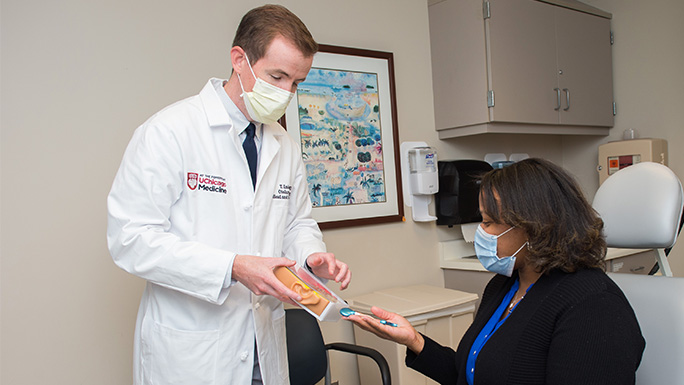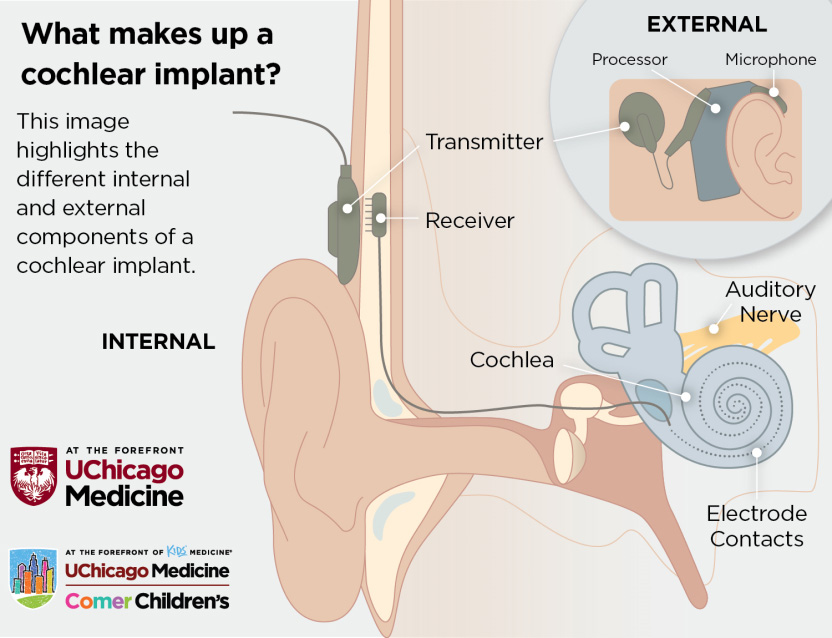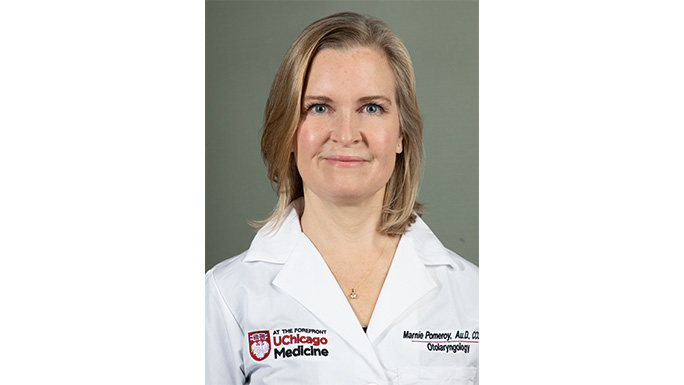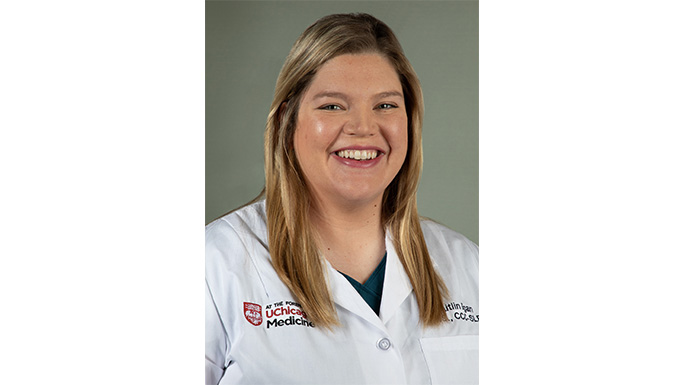Cochlear Implants in Adults

When considering a cochlear implant (CI), patients and their families should consider that the implant process is the start of a lifetime relationship with the institution and CI team where the surgery is performed Patients can feel confident that the University of Chicago CI program is outstanding. We routinely treat even the most complex cases, serving as one of the most comprehensive and experienced CI teams in the Chicagoland region.
What is a cochlear implant?
A cochlear implant is different than a traditional hearing aid. In simple terms, a traditional hearing aid picks up sound via a microphone and makes it louder, sending the signal through your auditory system. This is considered an ACOUSTIC signal. With different hearing losses, a hearing aid may not provide enough audibility and speech clarity.
Cochlear implants use an ELECTRICAL signal to stimulate the hearing nerve and send the information to your brain using a surgically placed internal component. The sound is picked up by the microphones of an external piece worn behind the ear or on the head and communicates with the internal implant. This external processor can be taken off throughout the day. The image below shows the internal and external components of a cochlear implant.

Cochlear implant services
Our Cochlear Implant Program provides comprehensive testing for pre-implant candidacy, as well as post-implant rehabilitation and mapping services. Below please find a comprehensive list of available services:
- Comprehensive hearing assessment
- Cochlear implant consultations
- Educational liaison to provide educational support
- Mappings
- Equipment checks and maintenance
- Bimodal hearing aid services
- Auditory verbal therapy
- Aural habilitation therapy
- Candidate speech-language evaluations
Who is a candidate for a cochlear implant?
Patients with sensorineural (nerve) hearing loss in one or both ears who no longer get adequate benefit from traditional hearing aids may be candidates for a cochlear implant. Patients typically have poor word recognition scores on their hearing tests. Patients may also be candidates if they still have residual, low-frequency (bass tone) hearing or just have hearing loss in one ear. Our cochlear implant program offers devices from all three FDA approved manufacturers, Advanced Bionics, Cochlear Americas and MED-EL.
If we determine that you are a candidate based on your recent hearing test (audiogram), we will schedule a comprehensive cochlear implant evaluation with one of our audiologists. We will test your ability to hear in quiet and noisy situations, with and without your current hearing aid(s). Our audiologist will also be able to review the available devices with you and help counsel you about the fitting and rehabilitation process.
Additional resources
Our Adult Cochlear Implant Team
Adult Cochlear Implant Audiologists

Dr. Shannon Barry is an audiologist who specializes in hearing care and tinnitus with adult patients. She received her Bachelor of Science in Audiology from the University of Texas, and received her Doctorate of Audiology from Rush University Medical Center. She completed her final year of clinical training at the Edward Hines Jr VA Medical Center. Dr. Barry is a Fellow at the American Academy of Audiology and an American Board of Audiology certificate holder in Tinnitus Management.

Dr. Jackie Hudson is an American Board of Audiology Certified audiologist with special interests in diagnosing hearing and balance disorders in the adult patient population. Dr. Hudson specializes in hearing aids, implantable devices and vestibular assessments. She received her bachelor of arts degree from Bradley University and her Doctorate of Audiology from Illinois State University. Dr. Hudson has presented clinical findings at several national audiology conferences.

Dr. Gabrielle Kosh received her Bachelor of Science degree in Speech and Hearing Science from the University of Illinois at Urbana-Champaign and received her Doctorate of Audiology from Northwestern University. She completed her final year of clinical training at the University of Chicago and specializes in diagnosing and treating hearing loss in the adult population. Dr. Kosh is a Fellow at the American Academy of Audiology.


Dr. Marnie Pomeroy is a pediatric audiologist specializing in diagnostic evaluations (including newborn hearing screening, behavioral testing, and auditory brainstem response evaluation), audiologic management of special populations, and hearing loss interventions such as hearing aids, osseointegrated devices, and cochlear implants. Dr. Pomeroy received her Doctorate of Audiology degree from the University of Tennessee and completed her clinical externship training at Cincinnati Children’s Hospital Medical Center. Dr. Pomeroy is certified by the American Speech-Language-Hearing Association and is a Fellow of the American Academy of Audiology.

Eric Seper completed his training at the University of Illinois at Urbana-Champaign. He has experience with all cochlear implant manufacturers as well as the hearing aid companies that complement cochlear implants. His professional experience includes both clinical care and hearing aid research.

Speech Language Pathologists

Caitlin Egan, M.S., CCC-SLP is a licensed American Speech Language Hearing Association (ASHA) certified speech-language pathologist who specializes in working with children with hearing loss. She has worked at UChicago Medicine and has been a member of the Pediatric Cochlear Implant and Hearing Loss Program since 2019. Her interests include providing comprehensive speech and language interventions in both spoken language and American Sign Language (ASL). She is currently working towards obtaining her credential as a Listening and Spoken Language Specialist Certified Auditory Verbal Therapist (LSLS Cert. AVT). Caitlin obtained her Master of Science degree in Speech Language Pathology from Western Illinois University in 2014, and her Bachelor of Science degree in Communication Sciences and Disorders from Western Illinois in 2012.

Michelle Havlik, MHS, CCC-SLP, LSLS Cert AVT is a licensed American Speech Language Hearing Association (ASHA) certified speech-language pathologist who specializes in listening and spoken language development in children with hearing loss. She has worked at UChicago Medicine and has been a member of the Pediatric Cochlear Implant and Hearing Loss Program since 2009. She became a Listening and Spoken Language Specialist Certified Auditory Verbal Therapist (LSLS Cert. AVT) in 2014 and has been a credentialed Early Intervention Specialist and Evaluator since 2007. She obtained her Master of Health Science degree in Communication Disorders from Governors State University in 2006 and her Bachelor of Arts degree in Speech-Language Pathology from Elmhurst College in 2001.
Schedule an Appointment

Schedule an Appointment Online
Learn more about our specialists and schedule an appointment directly through our online scheduling portal.

Schedule a Video Visit
Save time by skipping the trip to the doctor's office and video conference with your provider instead. Video visits are a secure, quick, and convenient way to connect with your doctor and other members of your care team.

